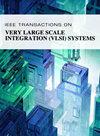基于多级部分和约简和PE阵列级负载平衡的非结构化稀疏dnn加速
IF 3.1
2区 工程技术
Q2 COMPUTER SCIENCE, HARDWARE & ARCHITECTURE
IEEE Transactions on Very Large Scale Integration (VLSI) Systems
Pub Date : 2025-06-20
DOI:10.1109/TVLSI.2025.3577626
引用次数: 0
摘要
非结构化剪枝在深度神经网络(dnn)中引入了显著的稀疏性,提高了加速器硬件效率。然而,三个关键挑战限制了性能的提高:1)非零(NZ)数据对的复杂获取逻辑;2)跨处理单元(PEs)的负载不平衡;3) PE因回写争用而停滞。本文提出了一种节能加速器,通过三项创新来解决这些低效率问题。首先,我们提出了一个笛卡尔积输出行平稳(CPORS)数据流,该数据流通过顺序获取压缩数据来固有地匹配NZ数据对。其次,多级部分和缩减(MLPR)策略最小化回写流量,并将随机PE失速转换为可管理的负载不平衡。第三,内核排序和负载调度(KSLS)机制解决PE空闲/停机问题,并实现PE阵列级负载平衡,在所有稀疏度级别上实现76.6%的平均PE利用率。该加速器采用22纳米CMOS,在基线上提供1.85倍的加速和1.4倍的能效,并在90%稀疏度下实现25.8 TOPS/W的峰值能效。本文章由计算机程序翻译,如有差异,请以英文原文为准。
Accelerating Unstructured Sparse DNNs via Multilevel Partial Sum Reduction and PE Array-Level Load Balancing
Unstructured pruning introduces significant sparsity in deep neural networks (DNNs), enhancing accelerator hardware efficiency. However, three critical challenges constrain performance gains: 1) complex fetching logic for nonzero (NZ) data pairs; 2) load imbalance across processing elements (PEs); and 3) PE stalls from write-back contention. This brief proposes an energy-efficient accelerator addressing these inefficiencies through three innovations. First, we propose a Cartesian-product output-row-stationary (CPORS) dataflow that inherently matches NZ data pairs by sequentially fetching compressed data. Second, a multilevel partial sum reduction (MLPR) strategy minimizes write-back traffic and converts random PE stalls into manageable load imbalance. Third, a kernel sorting and load scheduling (KSLS) mechanism resolves PE idle/stall and achieves PE array-level load balancing, attaining 76.6% average PE utilization across all sparsity levels. Implemented in 22-nm CMOS, the accelerator delivers $1.85\times $ speedup and $1.4\times $ energy efficiency over baseline and achieves 25.8 TOPS/W peak energy efficiency at 90% sparsity.
求助全文
通过发布文献求助,成功后即可免费获取论文全文。
去求助
来源期刊
CiteScore
6.40
自引率
7.10%
发文量
187
审稿时长
3.6 months
期刊介绍:
The IEEE Transactions on VLSI Systems is published as a monthly journal under the co-sponsorship of the IEEE Circuits and Systems Society, the IEEE Computer Society, and the IEEE Solid-State Circuits Society.
Design and realization of microelectronic systems using VLSI/ULSI technologies require close collaboration among scientists and engineers in the fields of systems architecture, logic and circuit design, chips and wafer fabrication, packaging, testing and systems applications. Generation of specifications, design and verification must be performed at all abstraction levels, including the system, register-transfer, logic, circuit, transistor and process levels.
To address this critical area through a common forum, the IEEE Transactions on VLSI Systems have been founded. The editorial board, consisting of international experts, invites original papers which emphasize and merit the novel systems integration aspects of microelectronic systems including interactions among systems design and partitioning, logic and memory design, digital and analog circuit design, layout synthesis, CAD tools, chips and wafer fabrication, testing and packaging, and systems level qualification. Thus, the coverage of these Transactions will focus on VLSI/ULSI microelectronic systems integration.

 求助内容:
求助内容: 应助结果提醒方式:
应助结果提醒方式:


